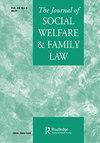Editorial
IF 0.9
Q2 LAW
引用次数: 0
Abstract
Spring 2022 has brought the prospect of a less adversarial divorce process for England and Wales. The implementation of the Divorce, Dissolution and Separation Act 2020 means that no-fault divorce has finally been introduced. The new law allows a couple jointly, or one of the spouses individually, to make a statement that the marriage has broken down irretrievably. This statement will provide conclusive evidence that the marriage has ended and there will be no need for either party to prove that the marriage has broken down by establishing the previously required ‘facts’ – of which the fault-based facts were the most commonly used. (ONS, 2022) The aim of the new law is to make the divorce process more amicable and less adversarial. Whilst the new divorce law does not make any changes to the financial and property arrangements spouses will make, some commentators have noted the ongoing concerns within the system about gender disparity of post-divorce finances, particularly regarding pensions. Webb and Taylor suggest that the ‘focus on speed and “moving on” may be to the detriment of fairness when it comes to pensions’ (Webb and Taylor, 2022, p. 2). It is with finances on separation in mind that we turn to the first paper in this issue which focuses on financial behaviour in adult relationships. Drawing on interview data, Charlotte Bendall argues that it is not relationship form that predominantly influences individuals’ approaches to finances. Instead, by adopting a relational lens, she suggests that there are other factors which influence behaviour, including the role of individuals’ parents and their relationship with finances. Whilst the first paper in this issue focuses on adult relationships within family law, our second paper considers the cross-border placement of children. In a highly topical piece, Jakub Pawliczak examines the placement of children into foster care in Poland by foreign authorities in light of Polish law reform in January 2018. This piece discusses the relevant Polish regulations and will be of particular interest for professionals who engage with cross-border placements in their work. The next two papers consider important topics which have a regulatory dimension, exploring the issues of social care and the social work profession. The first article, by Jane Lewis, explores the problem of social care in English Nursing and Residential Homes for Older People and explores the implications of a fragmented, for-profit social care system on sustainability and quality, focusing in particular on the workforce. She argues that reliance on regulation via the market is misplaced and that state regulation can play an important role in improving the sector. The second regulatory paper is by Sue Westwood who asks whether it is possible for religious social workers opposed to the LGBTQ way of life, to work affirmatively with them? In responding to this question, she explores, within a regulatory context, the case of Felix Ngole, a Christian fundamentalist social work student who was expelled from the University of Sheffield for comments he had posted on a public Facebook page and discusses the online responses to an article he wrote. JOURNAL OF SOCIAL WELFARE AND FAMILY LAW 2022, VOL. 44, NO. 2, 141–143 https://doi.org/10.1080/09649069.2022.2082822编辑
2022年春季,英格兰和威尔士的离婚过程可能会变得不那么敌对。《2020年离婚、解散和分居法》的实施意味着无过错离婚终于被引入。新法律允许夫妻双方共同或配偶一方单独声明婚姻已经不可挽回地破裂。这份声明将提供确凿的证据,证明婚姻已经结束,任何一方都不需要通过建立先前要求的“事实”来证明婚姻已经破裂——其中最常用的是基于过错的事实。(ONS, 2022)新法律的目的是使离婚过程更加友好,减少敌对。虽然新的离婚法没有对配偶的财务和财产安排作出任何改变,但一些评论人士注意到,在离婚后的财务方面,特别是在养老金方面,制度内对性别差异的关注仍在继续。韦伯和泰勒认为,“关注速度和‘继续’可能会损害养老金的公平性”(韦伯和泰勒,2022年,第2页)。考虑到分居的财务状况,我们转向本期的第一篇论文,该论文关注的是成人关系中的财务行为。根据采访数据,夏洛特·本德尔(Charlotte Bendall)认为,主要影响个人理财方式的不是关系形式。相反,通过采用关系视角,她认为还有其他因素影响行为,包括个人父母的角色及其与财务的关系。虽然本问题的第一篇论文侧重于家庭法中的成人关系,但我们的第二篇论文考虑了儿童的跨境安置。Jakub Pawliczak在一篇极具话题性的文章中,根据2018年1月波兰的法律改革,研究了外国当局在波兰安置儿童的情况。这篇文章讨论了相关的波兰法规,对于那些在工作中从事跨境安置的专业人士来说,这篇文章将特别有趣。接下来的两篇论文考虑了具有监管维度的重要主题,探讨了社会关怀和社会工作专业的问题。第一篇文章由简·刘易斯(Jane Lewis)撰写,探讨了英国养老院和养老院的社会关怀问题,并探讨了一个分散的、营利性的社会关怀系统对可持续性和质量的影响,尤其是对劳动力的影响。她认为,依赖市场监管是错误的,国家监管可以在改善该行业方面发挥重要作用。第二篇监管论文是苏·韦斯特伍德写的,她问反对LGBTQ生活方式的宗教社会工作者,是否有可能积极地与他们合作?在回答这个问题时,她在监管背景下探讨了菲利克斯·恩戈莱(Felix Ngole)的案例。恩戈莱是一名基督教原教旨主义社会工作专业的学生,他因为在一个公开的Facebook页面上发表评论而被谢菲尔德大学(University of Sheffield)开除,并讨论了对他写的一篇文章的在线回应。社会福利和家庭法杂志,2022年,第44卷,第2期。2,141 - 143 https://doi.org/10.1080/09649069.2022.2082822
本文章由计算机程序翻译,如有差异,请以英文原文为准。
求助全文
约1分钟内获得全文
求助全文
来源期刊
CiteScore
2.00
自引率
13.30%
发文量
52
期刊介绍:
The Journal of Social Welfare & Family Law is concerned with social and family law and policy in a UK, European and international context. The policy of the Editors and of the Editorial Board is to provide an interdisciplinary forum to which academics and professionals working in the social welfare and related fields may turn for guidance, comment and informed debate. Features: •Articles •Cases •European Section •Current Development •Ombudsman"s Section •Book Reviews

 求助内容:
求助内容: 应助结果提醒方式:
应助结果提醒方式:


